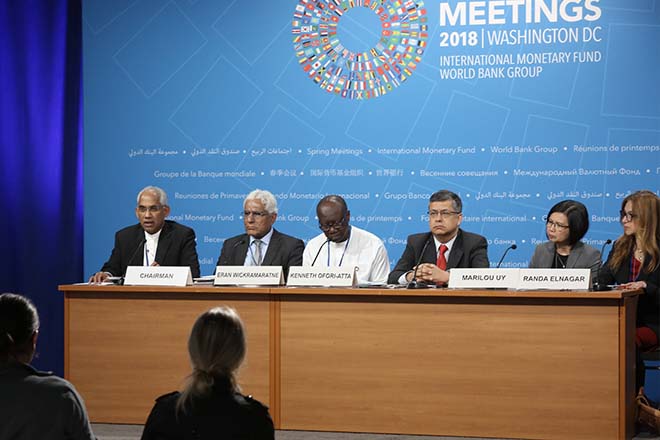Capacity building to manage public debt and liability is need of the hour: Eran

Apr 23, 2018 (LBO) - Sri Lanka as a developing nation needs to focus on building capacity for public debt and liability management as matter of priority, State Minister of Finance said.
“We recognize the importance of putting in place policies to reduce debt vulnerabilities and also look forward to hearing the perspectives of the WB and the IMF on supportive multilateral responses," Eran Wickramaratne, state minister of finance speaking at the G-24 ministers and governors meeting held ahead of the spring meetings of the International Monetary Fund (IMF) and World Bank Group (WBG) in Washington said.
"Building capacity for public debt and liability management, is a matter of priority for many of the developing countries who are members of the Group of G-24."
The finance ministers and Central Bank governors of the intergovernmental group of twenty-four on international monetary affairs and development (G-24) met in Washington D.C. under the chairmanship of Eran Wickramaratne.
The G-24 meeting was held ahead of the spring meetings of the International Monetary Fund (IMF) and World Bank Group (WBG).
The meeting was also addressed by Madame Legarde,Managing Director,IMF and Ms.Georgieva,CEO,World Bank.
The G-24 Ministers welcomed the recovery of global growth and investment.
The importance of sustaining inclusive growth-to enhance the resilience of member economies was emphasized as key priority of the group and increasing urgency of global cooperation to improve growth prospects of all countries was discussed.
At the same time, the members noted the heightened downside risks which may arise from a potential sharp tightening of financial conditions, further rise in protectionism, and geopolitical tensions.
The Ministers’ concerns revolved around the recent increase in trade restrictions in major economies as a source of significant policy uncertainty and reiterated the responsibility for workingtowards an open, rules-based, multilateral, and equitable trading system that benefits the global economy.
The necessity of strong Global Financial Safety Net with an adequately-resourced, quota-based IMF at its center was discussed at the meeting.
G-24 urged the continued support from IFIs and the international community to developing countries to face the challenge of serious humanitarian issues occurred through the refugee crises.
While welcoming the UN Global Compact on Migration, the members requested more analytical work to assess the potential macroeconomic and developmental impacts of the tightening of immigration regulations by some countries.
Having concerns over increased risks to debt sustainability in some developing countries and LICs, the Ministers of G-24 requested IMF and WBG to increase their assistance on liability management as a matter of priority and to develop a comprehensive and transparent debt reporting system, while encouraging the IMF, to facilitate creditor coordination.
G-24 agreed to urge the IMF and the WBG to continue to strengthen their assistance to improve domestic resource mobilization and stressed the importance of international tax cooperation to develop fair rules, avert harmful tax practices and competition, and enhance tax transparency.
The Ministers reiterated their call for effective international cooperation to combat illicit financial flows.
The members welcomed the WBG’s mainstreaming of disaster risk management in its country assistance strategies and investments in early warning systems. All countries were requested to implement their Nationally Determined Contributions under the Paris Climate Agreement.
It was emphasized that multilateral development banks (MDBs)should contribute more to catalyze deeper private financing expand infrastructure investments.
The Members agreed that the IBRD and IFC’s Shareholding Reviews should be concluded upholding the Istanbul Principles to achieve equitable voting power between developed and developing and transition countries while protecting the voting share of the smallest poor countries, and producing an outcome that has broad support from its members.
